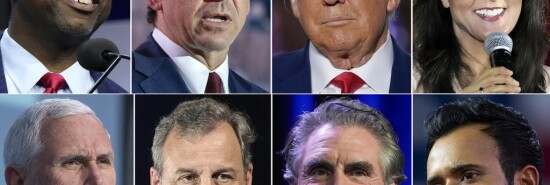
GOP crowded field panic
Byron York
GOP CROWDED FIELD PANIC. The Republicans who most want to defeat former President Donald Trump for the Republican nomination have long complained about the size of the GOP field. Dividing the opposition to Trump among so many candidates is a recipe for disaster, they say. And by “disaster,” they mean allowing Trump to run away with the Republican nomination. So they want the Republican field to shrink, fast.
Events in the race have been enormously frustrating to this group. It is mid-October, and the only candidates who have dropped out are Xavier Suarez and Will Hurd, neither of whom ever even qualified for a debate. Everybody else is still in. They are, in order of support in the RealClearPolitics average of national polls: Trump, Gov. Ron DeSantis (R-FL), former U.S. Ambassador to the United Nations Nikki Haley, entrepreneur Vivek Ramaswamy, former Vice President Mike Pence, former New Jersey Gov. Chris Christie, Sen. Tim Scott (R-SC), Gov. Doug Burgum (R-ND), and former Arkansas Gov. Asa Hutchinson. The bottom five are all under 5% support. Burgum and Hutchinson have less than 1% support.
Trump’s lead in the RealClearPolitics national average, at the moment, is 44.9 percentage points. His support is significantly more than all his opponents combined. In Iowa, his lead in the RealClearPolitics average is 33.2 points. In New Hampshire, it is 30.8 points. And in South Carolina, it is 32.5 points.
Subscribe today to the Washington Examiner magazine that will keep you up to date with what’s going on in Washington. SUBSCRIBE NOW: Just $1.00 an issue!
Trump’s advantage is shaping his strategy. Why should he take part in Republican debates if he is so far ahead? Certainly skipping the first two hasn’t hurt him. Why should he stand on the stage with all those candidates who are so far behind? Right now, Trump is running what amounts to a quasi-incumbent reelection campaign. He doesn’t have to engage his opponents, so he isn’t. It seems unlikely his strategy will change unless he experiences an erosion in the polls.
Those Republicans who want a smaller field are becoming more and more nervous. Recently, Sen. Mitt Romney (R-UT), the 2012 GOP presidential nominee, and former House Speaker Paul Ryan, who was Romney’s 2012 running mate, convened a meeting of big donors at the swanky Stein Eriksen Lodge in Park City, Utah. One big purpose of the gathering was to make a plea to Republicans to unite around a single candidate to challenge Trump.
But the problem was illustrated, not lessened, by the fact that four GOP candidates — Haley, Pence, Christie, and Burgum — showed up to work the (very wealthy) room. If they’re not willing to drop out, how does that get the anti-Trump faction any closer to a single challenger? As the conference ended, the field remained unchanged.
Another, almost amusing, indicator of GOP field panic is a new piece by the longtime conservative columnist George F. Will. Its headline in the Washington Post is: “Tim Scott, please drop out, urge others to follow and unite behind Haley.” A Scott withdrawal and endorsement of fellow South Carolinian Haley would be “statesmanlike,” said Will, who then outlined its benefit: “By catalyzing a coalescence around Haley, Scott could transform the nation’s political mood. As long as the Republican race pits Donald Trump against a cluster of lagging pursuers, the nominating electorate cannot ponder a binary choice. When, however, it is Trump against one experienced, polished, steely and unintimidated adversary, voters can internalize this exhilarating reality: There is a choice suitable for a great nation.”
That’s a pretty common argument in anti-Trump GOP circles, so its expression by the anti-Trump Will is not really remarkable. What is remarkable is this note preceding the column in the Washington Post: “Disclosure: The columnist’s wife, Mari Will, an adviser to Republican presidential candidate Sen. Tim Scott, disagrees with this column.”
So it’s hard to reach agreement, even within one household, on what should happen next. Trump’s critics are hoping the field will somehow magically reduce itself. That’s not going to happen. A lot of campaigning will have to take place before the day of a single Trump Republican opponent arrives, if it ever does.
For a deeper dive into many of the topics covered in the Daily Memo, please listen to my podcast, The Byron York Show — available on Radio America and the Ricochet Audio Network and everywhere else podcasts can be found.
